Video Presentation on…
“The Ego’s Purpose of
Belief in Separation & Sin”
(click here)
__________________________

In any given moment there are only two possible purposes for anything we seem to do or don’t do…
A discussion follows:
The Course tells us early on in the text that the only thing we should ever ask of anything is …”What is it for?” It uses that specific phrase at least five times throughout the book, and infers it in many other places. In any given situation or seeming drama, we should ask ourselves what is the purpose of this person, thing, or event in my life.
The Course reminds us constantly that the source and answer to that question depends on only one of two choices… of one of two teachers within us … the ego (the voice for separation and guilt), or the Holy Spirit (God’s Voice for healing and forgiveness). Accessing either one of those teachers will determine the way we look at and react to all of our lives’ day-to-day activities, whether it’s brushing our teeth or dealing with a tragedy. (See example of what is a phone call really for, in WB Lesson 25 “I do not know what anything is for.” on p. 38)
Is the purpose of any undertaking to see and reinforce guilt and blame in someone else and ultimately in myself, or is the interaction an opportunity for forgiveness (i.e. to see our true identity as God’s one innocent Son, instead of seeming separate entities full of sin and guilt )?
The ways we choose one of two inner teachers work like this…
Choosing the ego:
We seem to slip into ego default mode of judgement and condemnation without even recognizing it . Jesus tell us it is initially an intentional choice that we make out of fear in our minds, and then quickly forget we did that… (see Les. 136, par.3-5). We make an inner decision to believe in separation from God and each other. That decision is the real and only source of all our torment and suffering. We make up a new identity as a separated ego self and make this new ego identity our ‘guide,’ and don’t have a conscious clue we have done any of that (except we’re not feeling very peaceful)…
The ego’s purpose is to see separation, feel pain and suffering, but blame/project the source of our pain on someone or something else.
Thus the ego purpose for the way we are seeing anything or anybody in the world is to find fault and judge, without ever admitting to ourselves (1) we are constantly doing that, (2) that the ego is now our chosen teacher, and (3) that the ego’s purpose of ‘the need to blame’ has fully kicked in.
We are sure we are only reacting to a seemingly real world of victims and victimizers, and we simply have to ‘justifiably judge’ those we believe are causing us pain. We never recognize or take responsibility for our own internal wish to separate and maintain the pain and guilt of our own belief in that separation… by putting that responsibility on others.
Choosing The Holy Spirit:
We consciously ask the Holy Spirit or Jesus for help to see others and ourselves the way they do in any given situation or circumstance. That is… no matter what others or ourselves do or don’t do, if we ask for help, we can and will experience everyone together as one innocent Son of God. We begin to realize our separation from God and each other is totally made-up, no matter what seems to be happening in our world.
It doesn’t mean in time and space we don’t take appropriate actions. But it does mean we are willing to see our brothers a different way (true perception), and stop blaming them for our own chosen lack of peace and awareness of our One True Self… which was actually impossible in the first place (The Atonement).
Setting this process as our purpose and goal for each day is the Course’s definition of forgiveness.
(click here for further description of The Three Steps of Forgiveness.)

The Course uses the word purpose more than 700 times,
the word goal about 450 times,
intent/intentions 40 x, and motive/motivation 35 x.
Here are some of our favorite Course references…
on “Purpose:”

Don’t bother me… I’m busy being peaceful!
By becoming involved with tangential issues, it (the ego) hopes to hide the real question and keep it out of mind. The ego’s characteristic busyness with nonessentials (in the world) is for precisely that purpose. Preoccupations with problems set up to be incapable of solution are favorite ego devices for impeding learning progress (even when I fix things in the world it doesn’t bring me lasting peace). In all these diversionary tactics, however, the one question that is never asked by those who pursue them is, “What for?” This is the question that you must learn to ask in connection with everything. What is the purpose (the ego’s purpose of maintaining belief in separation, or the Holy Spirit’s purpose of forgiveness)? Whatever it is, it will direct your efforts automatically. When you make a decision of purpose (in the mind), then, you have made a decision about your future effort; a decision that will remain in effect unless you change your mind.
(Text Ch. 4, p.66, par. 6)

I have spoken of the ego as if it were a separate thing, acting on its own. This was necessary to persuade you that you cannot dismiss it lightly, and must realize how much of your thinking is ego-directed… The ego is nothing more than a part of your (own) belief about yourself.
(Text Ch. 4, p.67, par. 1)

The ego cannot oppose the laws of God any more than you can, but it can interpret them according to what it wants, just as you can (as a decision maker in our mind). That is why the question, “What do you want?” must be answered (separation or forgiveness, conflict or peace). You are answering it every minute and every second, and each moment of decision is a judgment that is anything but ineffectual. Its effects will follow automatically until the decision is changed. Remember, though, that the alternatives themselves are unalterable. The Holy Spirit, like the ego, is a decision (in the mind). Together they constitute all the alternatives the mind can accept and obey. The Holy Spirit and the ego are the only (actual) choices open to you…
(Text Ch. 5, p.85, par. 6)
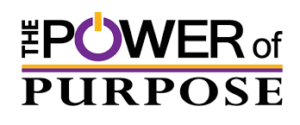
2 In any situation in which you are uncertain, the first thing to consider, very simply, is “What do I want to come of this? What is it for?” The clarification of the goal belongs at the beginning, for it is this which will determine the outcome… The ego does not know what it wants to come of the situation. It is aware of what it does not want (doesn’t want peace), but only that. It (the ego) has no positive goal at all.
3 Without a clear-cut positive goal (of peace & forgiveness) set at the outset, the situation just seems to happen, and makes no sense until it has already happened… And now the only judgment left to make is whether or not the ego likes it; is it acceptable, or does it call for vengeance? The absence of a criterion for outcome, set in advance, makes understanding doubtful and evaluation impossible.
4 The value of deciding in advance what you want to happen is simply that you will perceive the situation as a means to make it happen… It is quite noticeable that this approach has brought you closer to the Holy Spirit’s sorting out of truth and falsity. The true becomes what can be used to meet the goal. The false becomes the useless from this point of view. The situation now has meaning, but only because the goal (of forgiveness) has made it meaningful.
6 The goal of truth requires faith. Faith is implicit in the acceptance of the Holy Spirit’s purpose, and this faith is all-inclusive. .. This seems to ask for faith beyond you, and beyond what you can give. Yet this is so only from the viewpoint of the ego, for the ego believes in “solving” conflict through fragmentation, and does not perceive the situation as a whole. Therefore, it (the ego) seeks to split off segments of the situation and deal with them separately, for it has faith in separation and not in wholeness.
(Text Ch. 17, p.366, par.2-6)

6 The test of everything on earth is simply this; “What is it for?” The answer (ego’s purpose or HS) makes it what it is for you. It has no meaning of itself (in the world), yet you can give reality to it, according to the purpose that you serve (in your mind)…
11 And thus are two sons made, and both appear to walk this earth without a meeting place and no encounter. One do you perceive outside yourself, your own beloved (ego’s) son. The other rests within, his Father’s Son, within your brother as he is in you. Their difference does not lie in how they look, nor where they go, nor even what they do. They have a different purpose. It is this that joins them to their like, and separates each from all aspects with a different purpose. The Son of God retains His Father’s Will. The son of man (the ego’s son) perceives an alien will and wishes it were so. And thus does his (the ego’s) perception serve his wish by giving it appearances of truth (the world and its victimizers seem real). Yet can perception serve another goal. It is not bound to specialness but (only) by your choice. And it is given you to make a different choice (in our mind), and use perception for a different purpose. And what you see will serve that purpose well, and prove its own reality to you.
(Text Ch. 24, p.515, par.6 & 11)

5) Yet mind apart from spirit (Holy Spirit) cannot think. It has denied its Source of strength, and sees itself as helpless, limited and weak. Dissociated from its (true) function now (forgiveness), it (our mind) thinks it is alone and separate, attacked by armies massed against itself and hiding in the body’s frail support. Now must it reconcile unlike with like (hate with love), for this is what it thinks that it (our mind) is for.
6) Waste no more time on this. Who can resolve the senseless conflicts which a dream presents? What could the resolution mean in truth? What purpose could it serve? What is it for? Salvation cannot make illusions real, nor solve a problem that does not exist. Perhaps you hope it can. Yet would you have God’s plan for the release of His dear Son bring pain to him, and fail to set him free?
(WB Lesson 96, p.169)
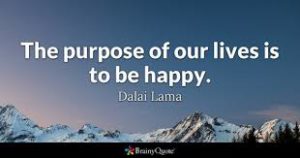
The Rules for Decision (at the beginning of Chap. 30, p.625) point out the practical value of setting our goal/purpose for the day, every day, by choosing with which inner teacher we wish to go through our day…
4 Throughout the day, at any time you think of it and have a quiet moment for reflection, tell yourself again the kind of day you want (guilt or forgiveness); the feelings you would have (conflictual or peaceful), the things you want to happen to you (seen through the eyes of the ego or the Holy Spirit), and the things you would experience (fear or love), and say:
If I make no decisions by myself, this is the day that will be given me.
(Text Ch. 30, p.626)

14 …The only question really is with what (whom) you choose to make them (decisions). That is really all. The first rule, then, is not coercion, but a simple statement of a simple fact. You will not make decisions by yourself whatever you decide. For they are made with idols (the ego) or with God (the Holy Spirit). And you ask help of anti-Christ or Christ, and which you choose will join with you and tell you what to do.
15 Your day is not at random. It is set by what you choose to live it with, and how the friend whose counsel you have sought perceives your happiness. You always ask advice before you can decide on anything. Let this be understood, and you can see there cannot be coercion here nor grounds for opposition… that you may be free.
(Text Ch. 30, p. 628)
————————————————–
In any given moment…
there is only one of two possible purposes …
for anything we seem to do or don’t do.
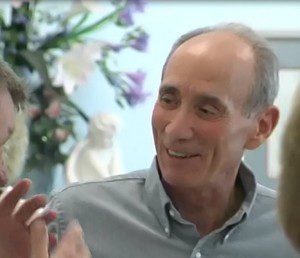
Two Short Ken Wapnick CD sets, and Mp3 downloads…
that focus on “Purpose”
(click on pics below):
This section called “Forgiveness and The End of Time” from the Text (Chap. 29, section VI) is a beautiful rendering of the pivotal theme of purpose recurring throughout the Course. Understanding purpose and how it is applied opens up the seeming secrets of the Course, specifically with regard to forgiveness as a theoretical principle, and more importantly as a principle that can guide us in our daily lives. This workshop thus helps us understand our world, our relationships, and our experiences in terms of the underlying purpose of the ego. Forgiveness begins with our asking Jesus to help us replace our pact with the ego with a vow to him no longer to be afraid of his love.
This 2007 workshop explores the two purposes for the body. The ego uses the body to fulfill its strategy of mindlessness, wherein the mind’s decision for the ego and its thought system of sin and destruction is hidden behind projection. Thus does the body become the engine of destruction that symbolizes the death of God and His Son. The Holy Spirit, on the other hand, shifts the body’s purpose from hate to forgiveness, so that it becomes the classroom in which we learn that nothing has occurred to change the sinlessness of God’s Son. As we choose again, the ego’s judgment becomes the Holy Spirit’s vision and we are healed.

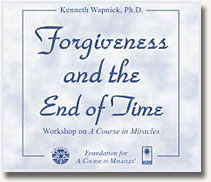
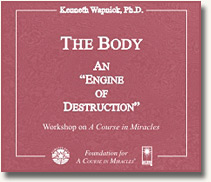

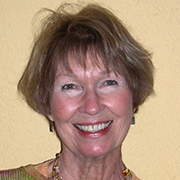
 The step out of time and into eternity (the timeless zone) calls for humility and the willingness to learn another way. We have to admit that we don’t know how to get there from here. Instead of it happening accidentally, like it did for me on the river, we have the inner Teacher that knows the way, and unlike my early experience that did not last, we can learn to reside there forever.
The step out of time and into eternity (the timeless zone) calls for humility and the willingness to learn another way. We have to admit that we don’t know how to get there from here. Instead of it happening accidentally, like it did for me on the river, we have the inner Teacher that knows the way, and unlike my early experience that did not last, we can learn to reside there forever.